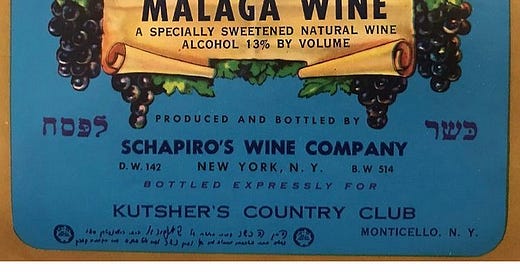Pairs Well With Matzo
Passover Wines. The Jewish holiday Passover begins Saturday night, and for those that celebrate, it is customary to drink four cups of wine during the traditional Seder meal. While the overly sweet Manischewitz has often been the poster child for kosher wine, there is so much more than that, including those from low-intervention winemaker Ya'acov Oryah (his orange wines!) and Dalton (that Pét-Nat!), both from Israel; and Ontario’s Tzafona Cellars (local Chardonnay and Icewine!). Below are additional recommended wines, and while not all may be available in Toronto, you may find some of these wineries at Simcha and LCBO Product of the World Specialty Boutiques for Kosher Products.
To Life. In Mosaic Magazine's Which Wines to Drink at the Seder This Year, and Why, Rabbi Meir Soloveichik provides an in-depth explanation of the function of wine during Passover. His essay also provides background on the traditional Jewish toast of “l’ḥayyim” (or l'chaim, ie. to life), and what that means right now:
This past pandemic year has been one in which the word l’ḥayyim has taken on a new resonance. We understand life’s fragility; and we understand how we might have taken togetherness for granted, and what a gift it is to join generations.
At the end of the essay, wine enthusiasts Joshua London and David Weinberg recommend some of their fave kosher wines including the Brut Rose from California’s Hagafen; Vermentino from Tuscany’s Cantina Giuliano; Rioja from Spain’s Elvi Wines; Celeste, a white blend from Pennsylvania’s Binah Winery; Mourvèdre from Israel’s Domaine Netofa; Chardonnay from Bat Shlomo Vineyards; a Bordeaux blend from Tura, a family winery in Israel; Cabernet Franc from Teperberg; and a Golan-grown red blend from Matar. For more info on these wineries see Mosaic’s kosher wine guide; and if you need even more recommendations, there’s the 2021 Pesach Wine Buying Guide from Yossie Horwitz of Yossie's Corkboard, a weekly newsletter about kosher wine.
(Some) Toronto Bottle Shops (Quickly) Pivot Back to Being Bars. On March 19 it was announced that outdoor dining could resume (with distance/safety measures) in Toronto and Peel Region, starting March 20. BlogTO reported that not all restaurant owners were pleased with the decision given they had less than a day to prepare. In a twitter thread, Toronto restauranteur Jen Agg (of Bar Vendetta, Le Swan, Grey Gardens, and Rhum Corner) said it’s “no small feat to go from takeout mode to operational mode.” And Chez Nous Wine Bar memed a similar sentiment on IG. A few days later, on March 22, it was reported that restaurant workers would be included in Phase 2 of the province’s COVID-19 vaccination distribution plan. Check with your local bar/bottleshop/bar for their pandemic patio protocol.
And NOW Magazine’s Kelsey Adams wrote about the The best new bottle shops in Toronto, and How Toronto bars transformed to survive the pandemic:
With access to those hard-to-get wines, bottle shops have made it easy for consumers to find good natural wines, orange wines and local Ontario producers that aren’t stocked at LCBO stores. However, this rise in bottle shops is intrinsically linked to the fact that many restaurants and bars are floundering and need a leg up to stay in business.
Adams’ article provides perspectives from Donna’s, Grape Crush, and Paris Paris / Nice Nice; info on Yuuji Nagaoka’s website BottleshopTO, a bottle shop directory organized by TO neighbourhoods; the need for wholesale alcohol pricing, with comments from David Ouellette, of Vela and IG account SkipTheLCBO, who has also noticed a trend towards ethical purchasing, which Ouellette believes is being accelerated by bottle shops.
The Ontario Budget and Wine. On March 24, the Ontario Minister of Finance released the 2021 Budget, Ontario's Action Plan: Protecting People's Health and Our Economy. While the focus of the budget is on health care, there were some commitments/re-announcements to support Ontario’s hospitality sector and local alcohol producers by:
Permanently allowing licensed restaurants and bars to include alcohol with food as part of a takeout or delivery (page 89);
Illustrating the provincial and federal relief that may be available to a restaurant for the first three months of 2021 (Chart 1.11, page 90); and
Providing a one‐time $10 million grant in 2021 to help wineries and cideries impacted by lockdown measures; in addition to extending the funding for the VQA Wine Support ($7.5 million) and Small Cidery ($1.8 million) programs to 2022–23 (page 91).






